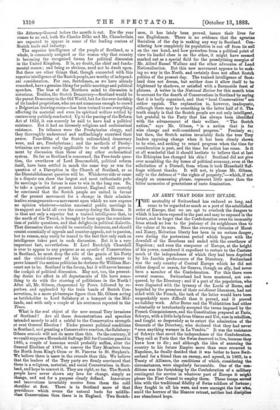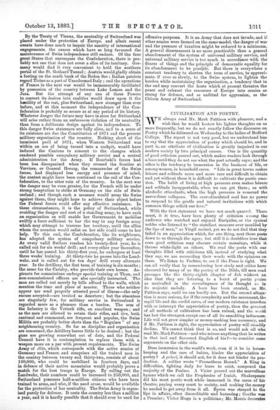AN ARMY THAT DOES NOT INVADE.
THE neutrality of Switzerland has endured so long, and come to be regarded so much as a part of the established order of Europe, that we are apt to overlook the dangers to which it has been exposed in the past and may be exposed in the future, and to forget that the Confederation owes its immunity from attack no less to the jealousy of. its neighbours than to the valour of its sons. Since the crowning victories of Morat and Nancy, Helvetian liberty has been in no serious danger, save during the portentous period which began with the downfall of the Bourbons and ended with the overthrow of Napoleon ; and even the conqueror of Europe, at the height of his power, considered it expedient to restore to the Cantons much of the independence of which they had been deprived by his Jacobin predecessors of the Directory. Switzerland was the only country of Central Europe which he did not either despoil or annex, for Geneva, though an ally, had never been a member of the Confederation. For this there were several reasons. Switzerland had been mastered, not con- quered, by the Directory ; and if a part of the population, who were disgusted with the tyranny of the Lords of Berne, and beguiled by the promises of their soi-disant liberators, had not sided with the French, the task of the latter would have been unspeakably more difficult than it proved, and it proved no holiday work. After Berne and the Waldstiitten had either voluntarily or involuntarily accepted the terms imposed by the French Compaissioners, and the Constitution prepared at Paris, Schwyz, with a little help from Glarus and Uri, rose in rebellion, and fought so desperately as to extort the admiration of the Generals of the Directory, who declared that they had never "seen anything warmer in La Vendee." It was the resistance of Schwyz that saved the independence of the Confederation. They said at Paris that the Swiss deserved to live, because they knew how to die ; and although the idea of annexing the country to his future Empire more than once occurred to Napoleon, he finally decided that it was better to have Swit- zerland for a friend than an enemy, and agreed, in 1803, to a Treaty of Alliance, the conditions of which, considering the circumstances, were singularly favourable. One of the con- ditions was the furnishing by the Confederation of a militaty contingent for service in whatever part of Europe it might please the First Consul to employ them. These troops served him with the traditional fidelity of Swiss soldiers of fortune ; they fought in all his wars, and were amongst the few who, amid the horrors of the Moscow retreat, neither lost discipline nor abandoned hope. By the Treaty of Vienna, the neutrality of Switzerland was placed under the protection of Europe, and albeit recent events have done much to impair the sanctity of international engagements, the causes which have so long favoured the maintenance of Swiss independence still endure. Of the four great States that encompass the Confederation, there is pro- bably not one that does not covet a slice of its territory. Ger- many would find it very convenient to hold the northern portal of the St. Gothard Tunnel ; Austria would gladly obtain a footing on the south bank of the Boden See ; Italian patriots regard Ticino as a part of Unredeemed Italy ; and the operations of France in the next war would be immeasurably facilitated by possession of the country between Lake Leman and the Jura. But the attempt of any one of these Powers to convert its desires into realities would draw upon it the hostility of the rest, plus Switzerland, now stronger than ever before, and at this moment the independence of the Con- federation is probably as secure as at any period of its history. Whatever danger the future may have in store for Switzerland will arise rather from an unforeseen violation of its neutrality than from a deliberate design against its independence. To this danger Swiss statesmen are fully alive, and to a sense of its existence are due the Constitution of 1874 and the present military organisation of the country. Nothing short of the imminent peril of 1871, when Western Switzerland was within an ace Of being turned into a cockpit, would have induced the Cantons to consent to the changes which rendered possible compulsory military service and a central administration for the Army. If Bourbaki's forces had been less disorganised when they crossed the frontier at Verviers, or General Herzog, the commander of the Swiss forces, had displayed leas energy and presence of mind, the contest might have been continued on the soil of the Con- federation, to the utter ruin of the country. In the next war the danger may be even greater, for the French will be under strong temptation to strike at Germany on the side of Swit- zerland; and though such a measure would array the Swiss against them, they might hope to achieve their object before the Federal forces could offer any effective resistance. In these circumstances, it is the policy of Switzerland, while avoiding the danger and cost of a standing army, to have such an organisation as will enable her Government to mobilise swiftly a force sufficient to bar the way to any foreign army which may attempt to traverse her territory, until the allies whom the occasion would enlist on her side could come to her help. To this end, the Confederation, like its neighbours, has adopted the system of compulsory military service. As every valid Switzer reaches his twenty-first year, he is called out for six weeks' drill ; and every other year thereafter, until he has passed his thirty-first year, he undergoes at least three weeks' training. At thirty-two he passes into the Land- wehr, and is called out for ten days' drill every alternate year. In the Artillery, the first term of training is six months ; the same for the Cavalry, who provide their own horses. As- pirants for commissions undergo special training at Than, and non-commissioned officers are also specially instructed. The men are called out merely by bills affixed to the walls, which mention the time and place of muster. Those who neither appear nor send properly attested proof of illness—the only excuse accepted—are treated as deserters ; but the absentees are singularly few, for military service in Switzerland is regarded more as a pleasure than a burden. The arm of the Infantry is the Vetterli rifle, an excellent weapon ; and as the men are allowed to retain their rifles, and tiro, both cantonal and communal, are frequent and popular, the Swiss Militia are probably better shots than the " Regulars " of any neighbouring country. So far as discipline and organisation are concerned, the Artillery leaves little to be desired ; but the guns are growing somewhat out of date, and the Federal Council have it in contemplation to replace them with a weapon more on a par with present requirements. The Swiss Army of Rite, which corresponds with the active armies of Germany and France, and comprises all the trained men in the country between twenty and thirty-two, consists of about 160,000, who could be mobilised in fourteen days, and in defence of their native mountains would probably prove a match for the best troops in Europe. By calling out the Landwehr, their numbers could be increased to 250,000, and Switzerland possesses half-a-million citizens who have been trained to arms, and who, if the need arose, would be available for the protection of her neutrality. The Swiss Army is organ- ised purely for defence. It costs the country less than a million a year, and it is hardly possible that it should ever be used for
offensive purposes. It is an Army that does not invade, and if other armies were formed on the same model, the danger of war and the pressure of taxation might be reduced to a minimum. A general disarmament is no more practicable than a general abandonment of the system of universal military service, and universal military service is too much in accordance with the fitness of things and the principle of democratic equality for its abandonment to be possible. But there is everywhere a constant tendency to shorten the term of service, to approxi- mate, if ever so slowly, to the Swiss system, to lighten the burden while maintaining the organisation, a tendency that in the end may convert the hosts which at present threaten the peace and exhaust the resources of Europe into armies as strong for defence, and as unfitted for aggression, as the Citizen Army of Switzerland.



































 Previous page
Previous page